► Hyundai Motor Group's bold hydrogen plans
► Future concepts include sports car and logistics vehicle
► New fuel cell systems planned, plus price parity aims
Hyundai Motor Group has laid out a new hydrogen plan – Hydrogen Vision 2040 – to roll out the use of hydrogen fuel cells across its product line over the next twenty years. HMG announced its roadmap at the Hydrogen Wave forum.
It's a sweeping range of plans, concepts and aims to get the world thinking more towards hydrogen as a viable zero-emission fuel source. Those plans include a pair of new fuel cell systems to be rolled out for commercial and passenger car vehicles that are produced at a lower cost, as well as concepts for performance cars and new logistics and emergency vehicles.
Read on for Hyundai Motor Group's bold plans.
So Hyundai is developing more fuel cell powertrains?
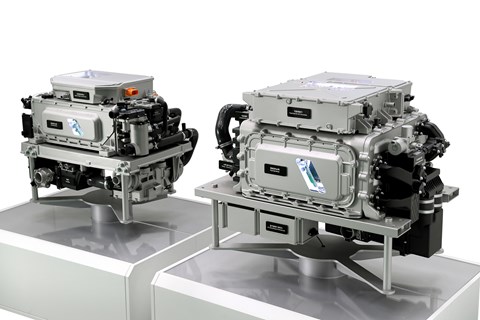
HMG announced two new 'third generation' fuel cell powertrains – a 100kW one for passenger car use and a larger 200kW one for commercial vehicle use.
The new 100kW (134bhp) one is around 30 per cent smaller than the one used in the Nexo hydrogen fuel cell SUV, reducing weight and allowing it to be applied to different vehicle types in the years to come. As for the 200kW (268bhp) powertrain, that's about the same size as the one used in the Nexo but produces double the power – HMG says this one is designed for its next-generation commercial vehicles.
This new system is also stackable for better flexibility in larger vehicles – even ones like trams and trains – and could generate up to one megawatt of power.
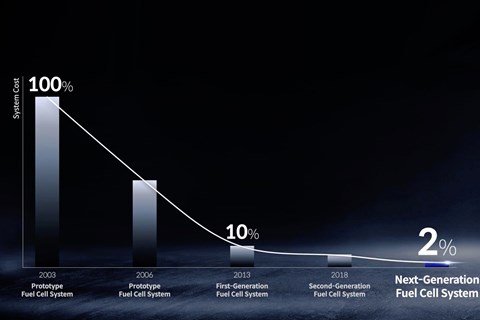
The developments of these new fuel cell powertrains are designed to lower costs. Hyundai claims that the prototype powertrain it developed was enormously expensive, but the price halved enough to make the ix35 Fuel Cell car. It halved again for the second-gen powertrain used in the Nexo, and these new technologies for the third generation are designed to lower these costs significantly once again. HMG aims to make a fuel cell vehicle price point comparable to that of a battery-electric car by 2030.
You mentioned a performance car?
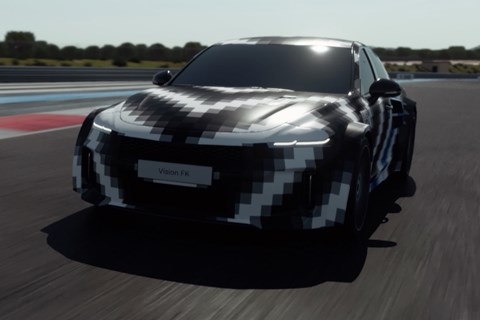
Yes. HMG head of R&D and technical wizard, Albert Biermann, announced Vision FK – a hydrogen fuel cell hybrid sports car concept. It's a collaboration with Rimac (which produces the batteries required to hold energy; HMG's fuel cell system interlinks with them) and is shaped like a two-door coupe. Biermann says the FK is 'a bit of technical overkill,' with 670bhp applied to the rear wheels and an aim to achieve more than 370 miles of range.
The Vision FK is just a concept for now, but shows Hyundai aims to make hydrogen available to performance cars.
How will this tech be used in commercial vehicles?
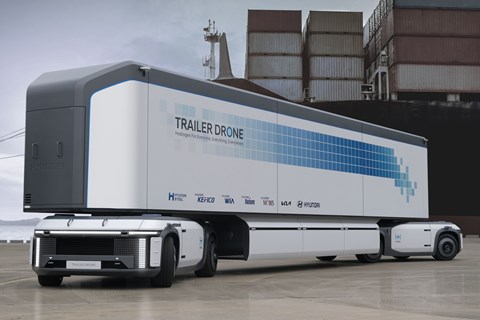
Well, HMG says it plans on applying fuel cell systems to all of its commercial vehicles, along with battery-electric powertrains. That means the group is stopping any further development into commercial vehicles using internal combustion engines.
Hyundai has investigated autonomous concepts for use in the logistics. A basis of that is the 'Fuel Cell e-Bogie'; a small, wheeled vehicle that acts like the bogie of a rail train. It's full autonomous, steered by all four wheels and can each carry one standard-size container. Hyundai points out that the e-Bogies can be used in cargo ports and can even cluster together into road trains. The e-Bogie might look familiar, as it has some design cues from the brand's new and upcoming range of Ioniq passenger cars with blocky lines and pixelated light signatures.
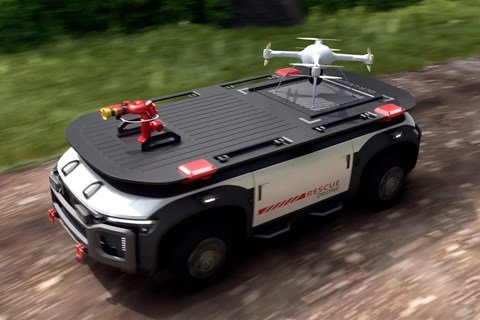
The e-Bogie is also the basis of the Trailer Drone concept. It interlinks two e-Bogie units together to carry a standard-sized lorry trailer container. HMG claims around 620 miles of range before needing to refuel.
Elsewhere, HMG has dreamt up emergency response and rescue vehicles. The Rescue Drone, for example, can be operated remotely or autonomously to help fight fires and locate those in need via an actual flying drone.
Isn't Hyundai working with Ineos, too?
To develop a hydrogen-powered Grenadier, yes. Ineos executives have spoken in the past about how hybrids didn't look like promising green alternatives for the Grenadier, but hydrogen-electric might, given that billionaire Sir Jim Ratcliffe's petrochemicals empire includes Inovyn, Europe's largest operator of electrolysis, the process by which renewable energy produces hydrogen for power generation, transportation and industrial use. The Ineos family already produces 300,000 tonnes of hydrogen a year, mostly as a by-product of its chemical manufacturing operations.
Ineos commercial director Mark Tennant has said: 'We're looking at a pure EV, but that's got its limitations in terms of the amount of our payload of one tonne that the batteries would use up. So that's not ideal. We're looking at hydrogen fuel cell as a possibility. For this class of vehicle that could be a more interesting conclusion, longer term. That's where Ineos has an interesting perspective, as a producer of hydrogen through its existing businesses.
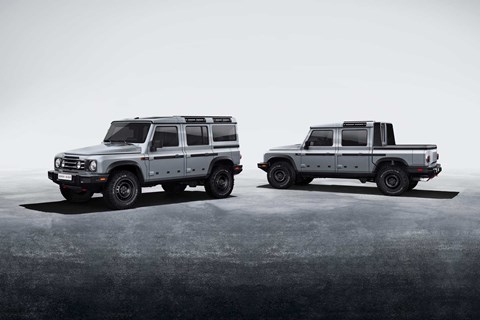
'We're launching with internal combustion engines, because to deliver on the engineering blueprint we don't think there's another game in town right now, but like everybody we're watching the development of technologies and infrastructure very closely.
'The internal combustion engine – clearly its days are numbered. We will need to move forward in other directions.'
And now Ineos and Hyundai have signed a memorandum of understanding to 'explore new opportunities to accelerate the global hydrogen economy'. That will involve the two companies working together on the production and supply of hydrogen, and the global deployment of hydrogen applications and technology.
Most relevantly to us, that includes evaluating Hyundai's proprietary fuel cell system for the Grenadier. That's the same system already available in the Hyundai Nexo, the world's first dedicated hydrogen-powered SUV, with the longest driving range of any hydrogen car currently available. If it's not a familiar sight on the roads, that's a combination of a £70k price and the scant availability of hydrogen refuelling stations.